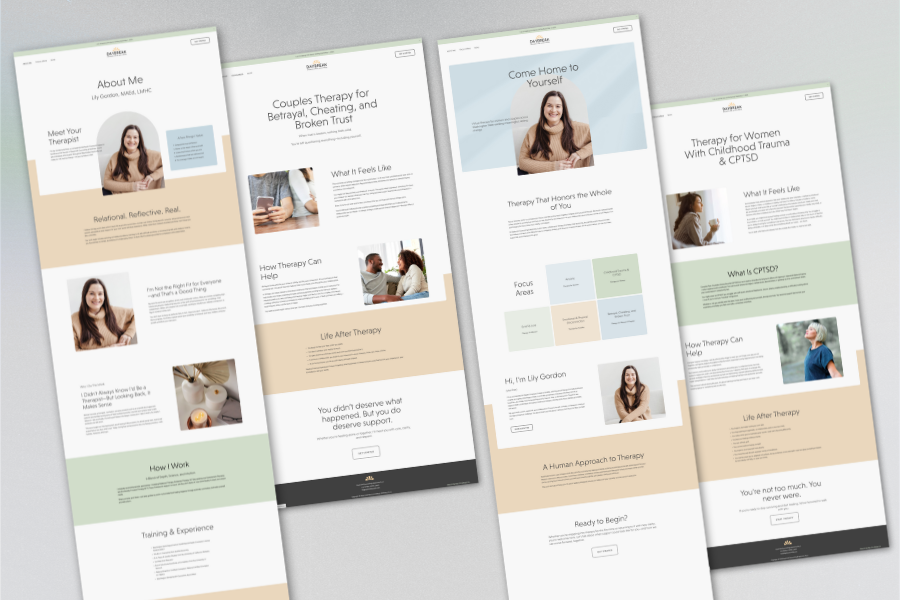What It Really Takes to Become the Go-To Therapist in Your Specialty
Quick Answer for Skimmers (and Search Engines):
To become the go-to therapist in your niche, you need more than a specialty. You need clear, consistent messaging, a recognizable point of view, and visibility in the places your ideal clients actually spend time. This article explains how private-pay therapists can build genuine authority through their tone, content, differentiation, branding, and community presence, while also using thoughtful marketing strategies beyond organic traffic to stay full with clients who are the right fit.
This article is part three of a three-part series on niching for therapists.
In part one, we explored how to choose a niche that feels aligned and sustainable. In part two, we focused on how to speak directly to your niche through your tone, language, and messaging.
In this final piece, we’re looking at what it means to become the go-to name in your niche, especially if you are private pay and need clarity, visibility, and trust to keep your practice full.
What It Really Takes to Become the Go-To Therapist in Your Specialty
Standing Out as the Expert in Your Niche
Once you have chosen your niche and learned how to speak to it, the question becomes: how do you stand out. How do you become the person people think of when they need exactly what you offer. How do you rise above the noise without feeling like you are shouting into the internet.
Therapists often imagine that becoming the go-to name requires a huge platform, complicated marketing, or constant content creation. But in reality, it begins much more simply. It begins with presence, clarity, consistency, and a point of view that feels unmistakably yours.
Let’s explore what it looks like to build genuine authority in your niche, especially if you are private pay and not relying on insurance networks to bring clients in.
1. Understand What “Expert” Actually Means
Being an expert is not about having all the answers or presenting yourself as perfect. Clients do not choose therapists based on credentials alone. They choose based on felt alignment.
To your ideal clients, an expert is someone who:
Understands their world
Speaks their language
Offers insight that feels grounded and relatable
Has a clear point of view
Communicates with confidence and compassion
Expertise is not only what you know. It is how you communicate what you know.
When clients feel seen, understood, and guided by your writing and presence, they naturally view you as a trusted voice in your niche.
2. Narrowing Your Niche Makes Authority Easier
Many therapists fear that choosing a niche will limit them, especially if they are private pay. But the more clearly defined your niche is, the easier it is to become known for it.
This is especially true in:
Less saturated niches
Specialties that are underserved
Smaller towns or regional communities
Telehealth niches with specific identity, experience, or symptom focus
Areas where the nuance matters and clients will search widely to find the right person
When clients are searching for something specific, they do not want a generalist. They want the person who seems to truly understand their experience.
In a small pond, you stand out quickly. In a larger pond, your specificity makes the search easier for your clients.
Private-pay therapists benefit from this clarity more than anyone.
3. Define What Sets You Apart
Differentiation is not about trying to be different for the sake of being different. It is about naming what is naturally and meaningfully distinct about your approach.
Start by considering:
What do your clients say is most helpful about working with you
What aspects of your approach consistently create change
What perspective or worldview shapes your work
What you believe about healing, identity, boundaries, or relationships
What you refuse to do or say because it does not feel aligned
What you focus on that others often overlook
Your differentiation is already there. You only need to name it clearly enough that clients can see it.
A single sentence can set you apart more effectively than a list of trainings.
4. Be Consistent in How You Show Up
Authority is built through repetition and coherence.
Examples of consistency:
Your tone is steady across your site and content
Your core message stays recognizable over time
Your visuals support the emotional atmosphere of your brand
Your examples and metaphors come from the same lived perspective
Your writing feels like the same person clients meet in the room
When your presence feels unified, people remember you.
Clients who discover you in one place and follow you to another begin to trust you. Trust grows into reputation.
5. Share Ideas That Reflect Your Point of View
To stand out in your niche, you must offer something more than information. You must offer insight. The way you see the problem is part of what makes you uniquely helpful.
This does not require “hot takes” or bold claims. It simply requires telling the truth as you experience it in your work.
You might share thoughts like:
What most clients misunderstand about their struggle
Patterns you see across your niche
What helps people move forward
Things therapists rarely talk about but your clients need to hear
Gentle reframes that open space for change
The deeper forces beneath common symptoms
When people resonate with the way you think, they begin viewing you as a guide they can trust.
This is the heart of thought leadership: naming truths that help people feel less alone.
6. Create Content That Helps People Feel Understood
Your content does not need to be constant. It needs to be helpful.
Whether you write once a week or once a month, aim for content that:
Mirrors your clients’ lived experience
Offers simple but meaningful insight
Helps people feel normal instead of wrong
Reduces confusion or self-blame
Helps them understand what their symptoms are actually signaling
Demonstrates your attunement to the nuances of their struggles
When your content feels therapeutic without being therapy, clients feel drawn to you.
7. Use Visual Branding That Reflects Your Niche and Voice
Your visual brand is not about aesthetics alone. It is a form of communication. It sets the emotional temperature of your practice.
Consider:
Colors that reflect the emotional world of your niche
Fonts that feel consistent with your tone
Imagery that communicates the mood of your work
Layouts and design choices that feel like your presence
Branding is not about beauty for its own sake. It is about coherence.
When visuals and messaging are aligned, authority follows naturally because clients sense you know who you are.
8. Build Authority Beyond Organic Traffic
Organic SEO is important, but private-pay therapists should diversify how clients find them. Think of authority as coming from multiple channels, not a single path.
Here are practical, therapist-friendly ways to grow visibility:
Local networking
Join community meetups, local business groups, or campus networks
Speak with primary care providers, coaches, doulas, or wellness practitioners
Offer to be a resource on a specific topic
Guest speaking or workshops
Give talks on boundaries, burnout, identity, midlife shifts, or relational patterns
Host small webinars with Q&A
Present at small virtual gatherings or coworking groups
Referral relationships
Warmly reach out to clinicians with complementary specialties
Send a brief introduction email highlighting who you help and how
Be the person others think of when they meet someone who fits your niche
Content partnerships
Write a guest article for a local magazine, blog, or university page
Offer a short educational post to a relevant organization’s newsletter
Participate in “expert roundup” style articles
Paid options (when appropriate)
Google Ads for niche-specific search terms
Sponsored placements in local directories
Small-budget Pinterest ads for niche topics
You do not need all of these. You only need a few consistent channels that help the right people find you.
9. Show Up in the Places Your Ideal Clients Spend Time
Your ideal clients are already gathering somewhere. The more specific your niche, the easier it is to find those spaces.
Examples:
Women in midlife might be in local Facebook groups, book clubs, parenting networks, or alumni circles.
Teens and their parents might be in local school clubs, sports, teams, discord servers, and creative spaces.
First responders often gather at union meetings, industry association events, gyms or training facilities, community safety programs, and online forums.
Clients with chronic illness often seek information from their doctors and other health care providers, online support groups, patient education workshops, and gentle movement classes for chronic pain or adaptive fitness.
Visibility is less about volume and more about choosing the right rooms. People trust the names they see repeatedly in the spaces that matter to them.
10. Let Authority Build Quietly Over Time
Becoming the go-to name in your niche is not a sprint. It is a slow accumulation of clarity, presence, generosity, and consistency.
Authority often grows without you realizing it:
Someone shares your blog with a friend
A client mentions a phrase from your website in session
A colleague refers someone because “you’re the person who really gets this”
A social post resonates deeply in a small circle
A workshop creates a ripple effect
The work expands because it is true, not because it is loud.
If you keep showing up in ways that feel aligned and grounded, people will begin to associate you with your niche naturally.
Closing Reflection
Becoming the go-to name in your niche is less about performing expertise and more about expressing it. It is about letting people see the way you think, care, write, and understand the deeper layers of their struggles. It is about clarity, not charisma. Consistency, not perfection. Presence, not pressure.
When your voice, message, brand, and visibility all support your niche, authority grows without forcing it.
And when clients find you, they will already feel something important: this person gets it.
Need more support?
If you want help turning your niche into a website and brand that communicates your expertise clearly, explore my therapist-specific website templates and One-Day Websites designed to elevate your voice and help therapists attract the clients they most want to serve.
Want to go deeper into niching? Explore more articles in the Niching Series and library:
Pin it!
Some of My Favorite Private Practice Tools
Resources and Referral Links / CLICK FOR DISCOUNTS!


































